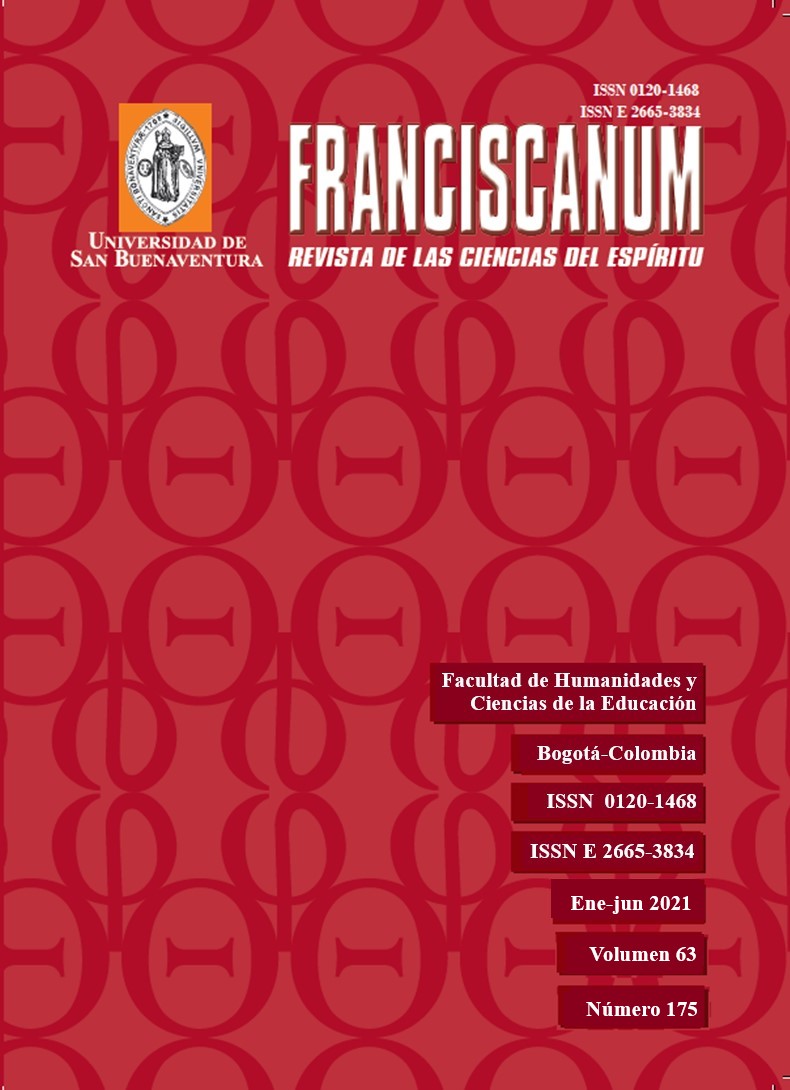Esta revista proporciona un acceso abierto inmediato a su contenido, basado en el principio de que ofrecer al público un acceso libre a las investigaciones ayuda a un mayor intercambio global de conocimiento.
Por tanto se acoge a la Licencia Creative Commons 4.0 Atribuciones Reconocimiento – CompartirIgual (by-sa): Se permite el uso comercial de la obra y de las posibles obras derivadas, la distribución de las cuales se debe hacer con una licencia igual a la que regula la obra original.
http://creativecommons.org/licenses/by-sa/4.0/
En este mismo sentido y en consonancia con la política del Acceso abierto, se aclara que los autores mantienen sus derechos sobre los artículos, sin restricciones y, del mismo modo, mantienen sus derechos de publicación, sin restricciones. Solamente se les solicita que referencien el número de la revista Franciscanum en donde apareció inicialmente el artículo.
Resumo
My goal in this paper is to compare Heidegger’s philosophy of science with Thomas Kuhn’s. With this comparison I want to pursue two goals: 1) using Kuhn’s arsenal of conceptual tools, to make Heidegger’s position appear in a clearer fashion; and 2) to show that Heidegger’s and Kuhn’s positions are not so different as one might expect. I will, thus, suggest that these philosophies can be compatible. I will show that, even if there are differences, there are many similarities as well. I will address three issues: 1) the differences and similarities between Kuhn’s notion of paradigm and Heidegger’s notion of world; 2) the analogous concepts of “normal science” and “calculating thinking”; and 3) the source of intelligibility in both authors. Here, I believe, is where the main difference between both thinkers lays.
Referências
Carnap, Rudolf. «The elimination of metaphysics through logical analysis on language». In Logical positivism, ed. Alfred Ayer, 60-81. London: Allen & Unwin, 1959.
Dreyfus, Hubert. «How Heidegger defends the possibility of a correspondence theory of truth with respect to the entities of natural science». In The Practice Turn in Contemporary Theory, ed. Theodore R. Schatzki, 159-171. London: Routledge, 2005. Doi: https://doi.org/10.1093/oso/9780198796220.003.0006
Emad, Parvis and Maly, Kenneth. «Translators' Foreword». In Contributions to Philosophy (From Enowing), auth. Martin Heidegger, XX–XXI. Bloomington: Indiana University Press, 1999.
Glazebrook, Trish. Heidegger’s philosophy of science. New York: Fordham University Press, 2000.
Haugeland, John. Dasein Disclosed. Cambdridge, Mass.: Harvard University Press, 2013.
Heidegger, Martin. Basic Questions of Philosophy. Selected «Problems» of «Logic». Bloomington: Indiana University Press, 1994.
Heidegger, Martin. Being and Time. New York: SUNY Press, 1996.
Heidegger, Martin. Contributions to Philosophy (Of the Event). Bloomington: Indiana University Press, 2012.
Heidegger, Martin. Discourse on thinking. New York: Harper & Row Publishers, 1966.
Heidegger, Martin. Identity and Difference. New York: Harper & Row Publishers, 1969.
Heidegger, Martin. Logic as the Question Concerning the Essence of Language. New York: SUNY Press, 2009.
Heidegger, Martin. Nietzsche. 2. The Eternal Recurrence of the Same. San Francisco: Harper San Francisco, 1991.
Heidegger, Martin. Off the Beaten Track. Cambridge: Cambridge University Press, 2002.
Heidegger, Martin. Pathmarks. Cambridge: Cambridge University Press, 1998.
Heidegger, Martin. The Question Concerning Technology. New York/London: Garland Publishing, 1977.
Heidegger, Martin. Towards the Definition of Philosophy. New York: Continuum, 2008.
Heidegger, Martin. What is Called Thinking? New York: Harper & Row Publishers, 1968.
Hoyningen-Huene, Paul. «Kuhn's conception of incommensurability». Studies in History and Philosophy of Science Part A 21.3 (1990): 481-492. doi: https://doi.org/10.1016/0039-3681(90)90006-t
Kuhn, Thomas. The Structure of the Scientific Revolution. Chicago: University of Chicago Press, 1970.
Lafont, Cristina. Heidegger, Language, and World- Disclosure. Cambridge: Cambridge University Press, 2000.
Lattis, James M. Between Copernicus and Galileo: Christoph Clavius and the Collapse of Ptolemaic Cosmology. Chicago: The University of Chicago Press, 1994. doi: https://doi.org/10.1163/221058785x01065
Loscerbo, John. Being and Technology: A Study in the Philosophy of Martin Heidegger. The Hague: Nijhoff, 1981.
Masterman, Margaret. «The Nature of a Paradigm». In Criticism and the Growth of Knowledge, ed. Imre Lakatos, Alan Musgrave, 59-90. Cambridge: Cambridge University Press, 1970.
Philipse, Herman. Heidegger’s Philosophy of Being. A Critical Interpretation. Princeton: Princeton University Press, 1998.
Polt, Richard. The Emergency of Being. On Heidegger’s Contributions to Philosophy. New York: Cornell University Press, 2006.
Pöggeler, Otto. The Paths of Heidegger’s Life and Thought. New York: Humanity Books, 1998.
Robbins, Breat Dean. «A reading of Kuhn in light of Heidegger as a response to Hoeller's critique of Giorgi». Janus Head 1, Vol. 1 (1998): 2-35.
Rouse, Joseph. «Kuhn, Heidegger, and scientific realism». Man and World 3, Vol. 14 (1981): 269-290. doi: https://doi.org/10.1007/bf01248749
Sankey, Howard. «Kuhn's changing concept of incommensurability». The British Journal for the Philosophy of Science 4, Vol 44 (1993): 759-774
Sheehan, Thomas. Making Sense of Heidegger: A Paradigm Shift. London: Rowman et Littlefield, 2015.
Vidal-Folch, Ignacio. «Entrevista a Mario Bunge: Las frases de Heidegger son las propias de un esquizofrénico». Revista de Pedagogía 84, Vol. 29 (2008): 187-190.
Welch, Cyril. «Review of The Anatomy of Disillusion: Martin Heidegger’s Notion of Truth by W. B. Macomber». Man and World 3 (1970): 135-146.
Wisser, Richard. Heidegger in Conversation. New Delhi: Arnold-Heinemann Publishers, 1977.



















